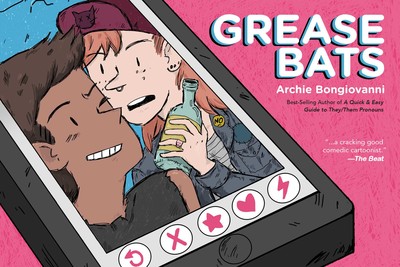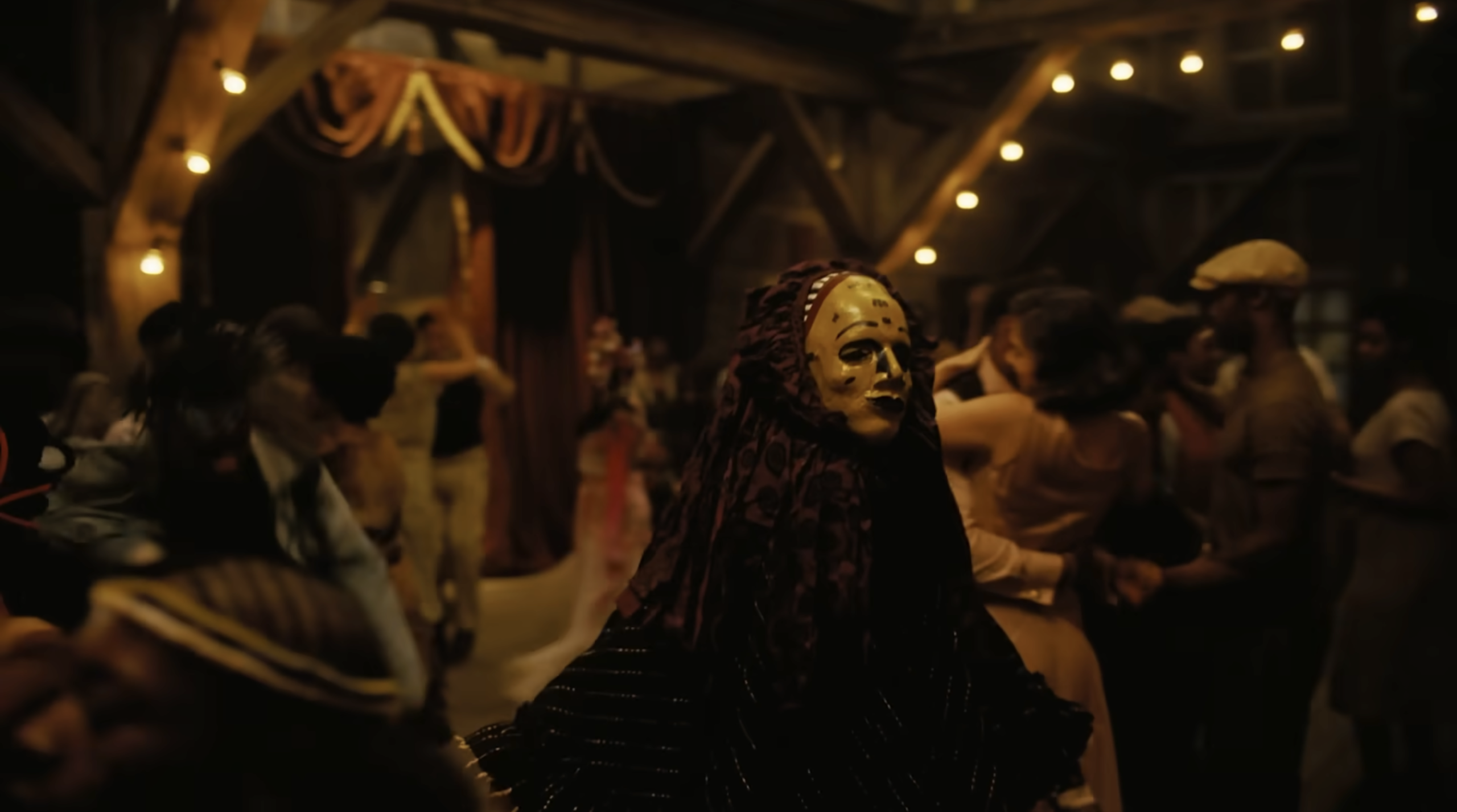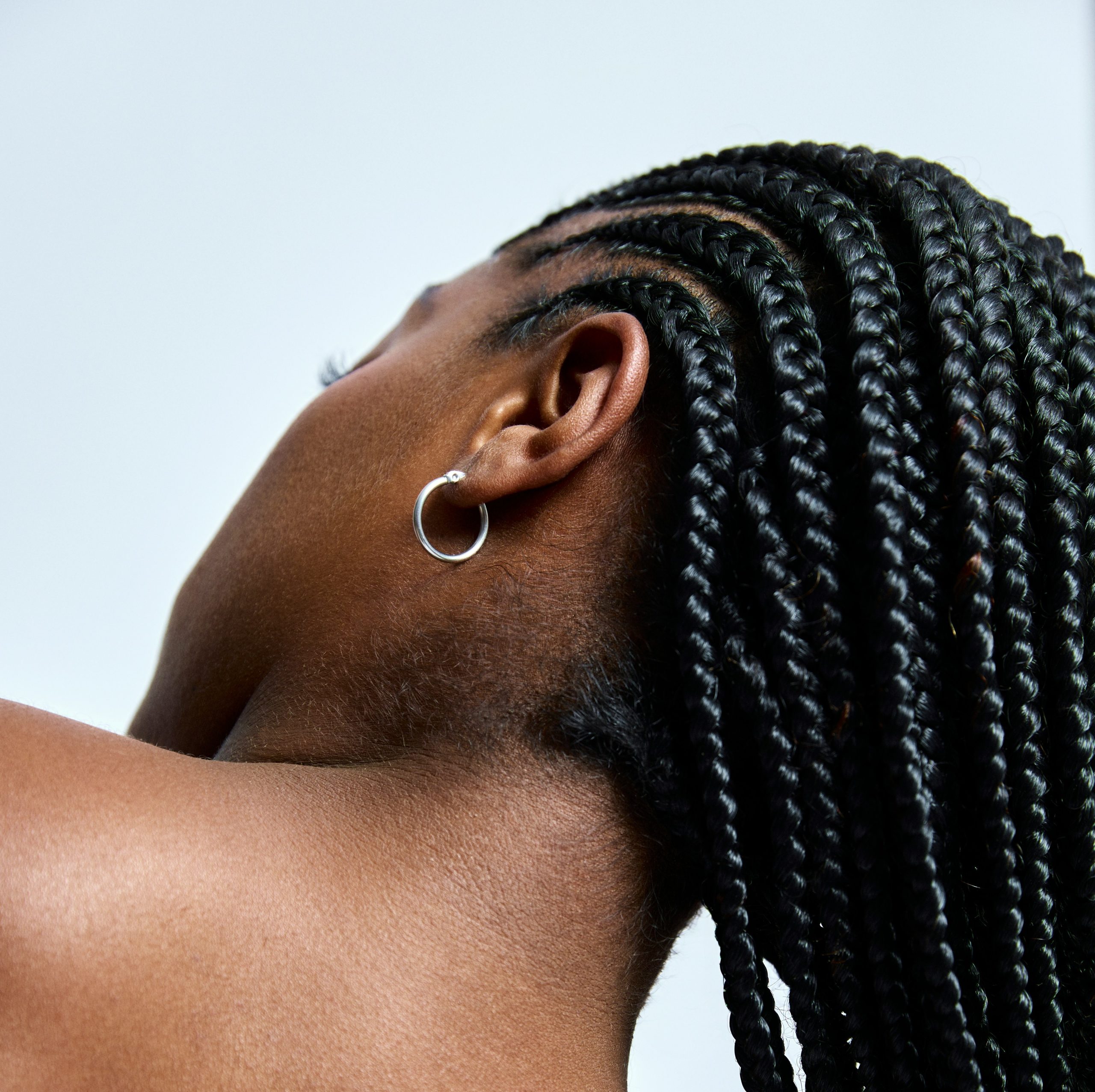Interviews
Queers Love Comics, and “Grease Bats” Loves Queers
Archie Bongiovanni's graphic novel is a loving ode to queerness, genderqueerness, and Minneapolis

When you meet Archie Bongiovanni, you may feel as though you already know them. The jorts, the stick-n-poke tattoos, the larger-than-the-room laugh that means you always know where they’re standing. That’s because Bongiovanni’s incredibly endearing energy winds up all over the page in Grease Bats, their new slice-of-life graphic novel released by Boom! Studios. Bongiovanni has been drawing the comic strip that became the book, which features a group of queer and trans friends friending around a fictional Minneapolis, for more than five years on Autostraddle. For three of those years, I was their editor, which means I had a lot of questions. I recently caught up with Bongiovanni to chat about the experience of capturing the beating heart of a community on the page. We talked about the magic of trans cartoonists drawing trans characters, the superpower of fiction in addressing problems within marginalized communities, and why so many queer people seem to be so into comics.
A.E. Osworth: Can you tell me how the idea or inclination for the comic strip that preceded the graphic novel Grease Bats came about?
Archie Bongiovanni: I wanted to draw a story that felt reflective of my life at the time. I first started drawing the story-in my twenties, often drunk, probably horny, making some awesome decisions and the occasional messy ones, showing up for your friends and allowing them to show up for you, here in Minneapolis. I basically conceived Andy and Scout the day after Autostraddle (and you) asked if I’d be interested in a monthly comic.
AEO: If that’s the case, what made you decide to tackle something fictional, rather than something autobiographical?
AB: I was working on a lot of personal zines at the time and wanted something fun and reflective of the community I was around. I wanted to play with the dichotomy of two very different characters who loved and adored each other, but ultimately have pretty different personalities.
AEO: And fiction allowed you to do that in a way memoir didn’t?
AB: Yes, it allowed me to use moments from my life, but I got to play these moments out in characters who’d sometimes react differently than I would have! I got to play with things that happened to my friends or the idea of something—like queer karaoke being canceled because queers were too broke to sustain it at the bar.
Grease Bats allows for nuance; the characters are meant to showcase our variations, not our monolithic identities.
AEO: Was there ever a time you used the power of fiction to address something in the queer community that would have, if you had addressed it in nonfiction, resulted in more resistance? I’m personally thinking about the extreme “cancel culture” that marginalized communities sometimes engage in when it comes to policing their own, but you can take this question in any direction.
AB: I like this comic, which is ultimately about empathy, because so many of my characters feel differently about different things, and it’s not always a clean wrap up but it does end in some understanding and patience for the other. Grease Bats allows for nuance; the characters are meant to showcase our variations, not our monolithic identities.
AEO: One of the superpowers that I see in your comics is that someone will do something kinda fucked up, and maybe even another character will yell at them for it, but I’ve actually never seen a reader say they hate a character for doing something imperfect. Has that been your experience?
AB: Yup! I think my characters are (at times) really frustrating and frustrate each other and that is the truest thing of life. My pals frustrate me at times, and I know I annoy them at times as well! I’ve done some real dumb shit and there’s a balance of calling someone out on acting carelessly while also allowing them the time and space to act better in the future. And apologizing! My characters apologize to each other all the time. And I think readers like that, knowing that we all biff it sometimes and allowing for the folks we care about to biff it too. We’re imperfect, but learning. My chosen family is family, meaning at times we have the power to really hurt the other’s feelings but we also have the power to push through it together!
AEO: I want to dive in on genderqueerness if that’s okay. Is that something you’re comfortable talking about?
AB: Yes please!
AEO: As a reader and as a person who edited you for many years, I feel this incredible power radiate from watching a genderqueer artist render a genderqueer body on the page. What does that experience feel like for you? Empowering, totally mundane? Do I have a Romantic-Capital-R notion of this that is entirely unfounded?
AB: Oh it is awesome. I love drawing Andy being over-emotional when being called “sir” at a restaurant then having a crisis because that still means they’re being misgendered. I loved drawing the chapter “A Case of the Floppies” where Scout tries to distract Andy from their dysphoria by playing skeeball. It lets me draw these experiences I have authentically and non-academically, with a good dose of humor.
AEO: What do you mean when you say non-academically?
AB: So much trans and genderqueer discussion is serious. I get to draw it in a way that’s yeah, serious, but also playful! I love being genderqueer, it really comes from a playful relaxed place for me now.
So much trans and genderqueer discussion is serious. I get to draw it in a way that’s also playful!
AEO: Was that the case for you when you started drawing Andy? Or was that something both you and Andy grew into together?
AB: Oh for sure, I was just starting to come out as genderqueer. When I first started this comic, I didn’t go by Archie. And it was definitely something that I got more and more confident in. And I love Andy’s sense of genderqueerness, their love of painting their nails and micro-jorts and crop tops and they really give themself the space to Be Themself. I like that about all the characters. They allow space for them to just be their authentic selves and encourage each other to do the same.
AEO: Is there anything difficult about drawing Andy? And does that come from their particular place in the gender galaxy or from somewhere else?
AB: Andy is honestly the easiest for me to draw because I think and feel so much like them.
AEO: Who’s the hardest?
AB: Gwen and Taylor! I think Taylor is hard because they are the newest character and I have to make sure I’m checking myself about drawing them as a whole character and not just a person in grad school. And Gwen is hard because she is often, by the fault of me and also almost all my other characters besides Ari, put in a caretaking role, which is very reflective of femme folks in queer circles and isn’t fair to them or to Gwen.
AEO: I’m trying to come up with the right question about Gwen, and her femme-ness being exploited as caretaking, and I’m having trouble phrasing it. I want to acknowledge that the struggle is because I’m not femme. Something about whether you feel the need to disrupt this huge flaw in the community, that we often treat femmes as caretakers, or if you want to hold the mirror up to it and represent it accurately?
AB: I think it’s that I feel the need to challenge it and I haven’t had the confidence to draw that comic yet. It’s a little bit because I’m not sure I’m the best one to do it. I try and draw a lot of comics where Gwen is JUST Gwen, but there are chapters like The Job Hunt where she leans into caretaking. She def pushes back though, as seen in Astrology Is Real And Meaningful.

AEO: Because it’s fiction, does that mean you can talk about stuff that isn’t necessarily your experience? Is that one of the superpowers of fiction? I always struggle to answer this question myself! I am always mad when a cis person writes a bad trans character. And I’m reading it and thinking, just let trans people tell their own stories! But then I am also mad when a cis author doesn’t even give it a go. This is a real, earnest, hard question to which I am not sure there is a correct answer
AB: I don’t know if there’s a “correct” answer either, but there’s a way I try to guide my work so it has the diverse cast that’s needed to tell queer slice-of-life stories. I cannot forget where I am coming from and how that limits my lived experience and the privileges that come from it. But also, empathy is critical here, empathy and listening. I listen and believe my friends of different lived experiences where their life has challenges and their identity results in assumptions that I wouldn’t face myself.
Also if someone has written a bad trans character I’m always like…do they have trans friends?
AEO: That answer is almost always no, but it’s not never yes.
So speaking of all these other characters that are a bit harder to access, you mentioned that when Autostraddle first asked you for a monthly comic, you scoped out Andy and Scout first. But in the intervening years and specifically in the graphic novel collected version, the cast got much, much bigger. Can you talk about why it started out with two and why it expanded?
AB: It started out as two because I didn’t trust myself to draw more than two characters and have an audience care about them, especially when the comics only appeared once a month. I was real nervous about new characters but I WANTED THEM so badly. But in my mind I was like “readers won’t care or they’ll forget the next time a comic comes out.” I was wrong on all accounts! I want to introduce more characters soon!
AEO: Do you feel comfortable giving us a teaser?
AB: I want to draw Scout’s new girlfriend and have her be a part of the comic!
AEO: Topic change! Perhaps it is because I came to comics as an adult, but it is my perception that queer people love comics or are more likely to love comics than any other subset of folks. Indulge me in my probably-inaccurate presumptions for a second, do you think that’s true? Is that your experience?
Queers love comics! A lot! I think because it’s an easy medium to see yourself reflected in.
AB: Yes! Queers love comics! A lot! I think because it’s an easy medium to see yourself reflected in, unlike television where there’s SO many people that are involved to dilute or change the story. Perspective comics are often just one person drawing in their studio. And it’s an affordable medium as well.
AEO: Is there anything else you want the folks at home to know?
AB: That Minneapolis fucking rocks! Or at least the queer community here does!
AEO: Oh my goodness, yes, we didn’t talk about the role Minneapolis plays in the graphic novel! I think it’s often overlooked, but this is an explicitly midwestern queer story. Can you expound upon that a little?
AB: Minneapolis is so active and so busy and there’s so, so many cool people here doing the raddest stuff. There’s the most talented artists and activists that I am privileged to be among! All of the events that happen in the story are based on Minneapolis events (except the ’90’s lesbian floral witch party, that was D.C.).
AEO: That was a real party? Who threw that party? Do we know them?
AB: I was in Brooklyn at a queer event and someone was talking shit about Brooklyn and how the queers there suck compared to Manhattan and they were like “know what I mean?” And I was like not at all, I’m from Minneapolis, and she was like “oh no then you have NO idea about queers then, NONE.” It’s so dismissive and does such a disservice to all the queers working real hard in mid-sized cities or rural areas or basically anywhere that isn’t a gay hub. A lot of praise gets given to queer cities like San Francisco and Portland and the like, and that’s rad, but queer history and community is everywhere and it’s just as vibrant and vital (and sexual and fun!) as anywhere.
Also I do not know who threw that party. But I did get a giant hickey at that party.









